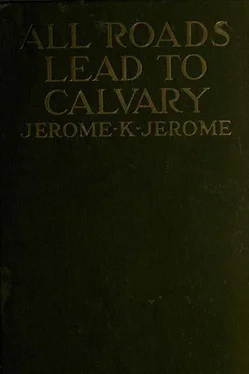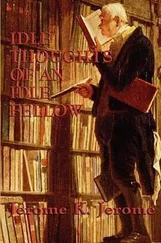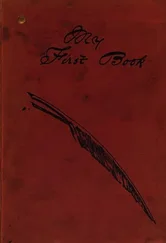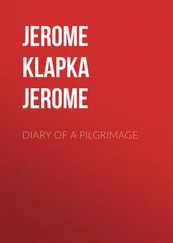Jerome Jerome - All Roads Lead to Calvary
Здесь есть возможность читать онлайн «Jerome Jerome - All Roads Lead to Calvary» весь текст электронной книги совершенно бесплатно (целиком полную версию без сокращений). В некоторых случаях можно слушать аудио, скачать через торрент в формате fb2 и присутствует краткое содержание. Город: London, Год выпуска: 1919, Издательство: Hutchinson & Co., Жанр: Классическая проза, на английском языке. Описание произведения, (предисловие) а так же отзывы посетителей доступны на портале библиотеки ЛибКат.
- Название:All Roads Lead to Calvary
- Автор:
- Издательство:Hutchinson & Co.
- Жанр:
- Год:1919
- Город:London
- ISBN:нет данных
- Рейтинг книги:3 / 5. Голосов: 1
-
Избранное:Добавить в избранное
- Отзывы:
-
Ваша оценка:
- 60
- 1
- 2
- 3
- 4
- 5
All Roads Lead to Calvary: краткое содержание, описание и аннотация
Предлагаем к чтению аннотацию, описание, краткое содержание или предисловие (зависит от того, что написал сам автор книги «All Roads Lead to Calvary»). Если вы не нашли необходимую информацию о книге — напишите в комментариях, мы постараемся отыскать её.
All Roads Lead to Calvary — читать онлайн бесплатно полную книгу (весь текст) целиком
Ниже представлен текст книги, разбитый по страницам. Система сохранения места последней прочитанной страницы, позволяет с удобством читать онлайн бесплатно книгу «All Roads Lead to Calvary», без необходимости каждый раз заново искать на чём Вы остановились. Поставьте закладку, и сможете в любой момент перейти на страницу, на которой закончили чтение.
Интервал:
Закладка:
And yet was it altogether a dead truth: this passionate belief in a personal God who had ordered all things for the best: who could be appealed to for comfort, for help? Might it not be as good an explanation as any other of the mystery surrounding us? It had been so universal. She was not sure where, but somewhere she had come across an analogy that had strongly impressed her. “The fact that a man feels thirsty — though at the time he may be wandering through the Desert of Sahara — proves that somewhere in the world there is water.” Might not the success of Christianity in responding to human needs be evidence in its favour? The Love of God, the Fellowship of the Holy Ghost, the Grace of Our Lord Jesus Christ. Were not all human needs provided for in that one comprehensive promise: the desperate need of man to be convinced that behind all the seeming muddle was a loving hand guiding towards good; the need of the soul in its loneliness for fellowship, for strengthening; the need of man in his weakness for the kindly grace of human sympathy, of human example.
And then, as fate would have it, the first lesson happened to be the story of Jonah and the whale. Half a dozen shocked faces turned suddenly towards her told Joan that at some point in the thrilling history she must unconsciously have laughed. Fortunately she was alone in the pew, and feeling herself scarlet, squeezed herself into its farthest corner and drew down her veil.
No, it would have to go. A religion that solemnly demanded of grown men and women in the twentieth century that they should sit and listen with reverential awe to a prehistoric edition of “Grimm’s Fairy Stories,” including Noah and his ark, the adventures of Samson and Delilah, the conversations between Balaam and his ass, and culminating in what if it were not so appallingly wicked an idea would be the most comical of them all: the conception of an elaborately organized Hell, into which the God of the Christians plunged his creatures for all eternity! Of what use was such a religion as that going to be to the world of the future?
She must have knelt and stood mechanically, for the service was ended. The pulpit was occupied by an elderly uninteresting-looking man with a troublesome cough. But one sentence he had let fall had gripped her attention. For a moment she could not remember it, and then it came to her: “All Roads lead to Calvary.” It struck her as rather good. Perhaps he was going to be worth listening to. “To all of us, sooner or later,” he was saying, “comes a choosing of two ways: either the road leading to success, the gratification of desires, the honour and approval of our fellow-men — or the path to Calvary.”
And then he had wandered off into a maze of detail. The tradesman, dreaming perhaps of becoming a Whiteley, having to choose whether to go forward or remain for all time in the little shop. The statesman — should he abide by the faith that is in him and suffer loss of popularity, or renounce his God and enter the Cabinet? The artist, the writer, the mere labourer — there were too many of them. A few well-chosen examples would have sufficed. And then that irritating cough!
And yet every now and then he would be arresting. In his prime, Joan felt, he must have been a great preacher. Even now, decrepit and wheezy, he was capable of flashes of magnetism, of eloquence. The passage where he pictured the Garden of Gethsemane. The fair Jerusalem, only hidden from us by the shadows. So easy to return to. Its soft lights shining through the trees, beckoning to us; its mingled voices stealing to us through the silence, whispering to us of its well-remembered ways, its pleasant places, its open doorways, friends and loved ones waiting for us. And above, the rock-strewn Calvary: and crowning its summit, clear against the starlit sky, the cold, dark cross. “Not perhaps to us the bleeding hands and feet, but to all the bitter tears. Our Calvary may be a very little hill compared with the mountains where Prometheus suffered, but to us it is steep and lonely.”
There he should have stopped. It would have been a good note on which to finish. But it seemed there was another point he wished to make. Even to the sinner Calvary calls. To Judas — even to him the gates of the life-giving Garden of Gethsemane had not been closed. “With his thirty pieces of silver he could have stolen away. In some distant crowded city of the Roman Empire have lived unknown, forgotten. Life still had its pleasures, its rewards. To him also had been given the choice. The thirty pieces of silver that had meant so much to him! He flings them at the feet of his tempters. They would not take them back. He rushes out and hangs himself. Shame and death. With his own hands he will build his own cross, none to help him. He, too — even Judas, climbs his Calvary. Enters into the fellowship of those who through all ages have trod its stony pathway.”
Joan waited till the last of the congregation had disappeared, and then joined the little pew-opener who was waiting to close the doors. Joan asked her what she had thought of the sermon, but Mary Stopperton, being a little deaf, had not heard it.
“It was quite good — the matter of it,” Joan told her. “All Roads lead to Calvary. The idea is that there comes a time to all of us when we have to choose. Whether, like your friend Carlyle, we will ‘give up things’ for our faith’s sake. Or go for the carriage and pair.”
Mary Stopperton laughed. “He is quite right, dear,” she said. “It does seem to come, and it is so hard. You have to pray and pray and pray. And even then we cannot always do it.” She touched with her little withered fingers Joan’s fine white hand. “But you are so strong and brave,” she continued, with another little laugh. “It won’t be so difficult for you.”
It was not until well on her way home that Joan, recalling the conversation, found herself smiling at Mary Stopperton’s literal acceptation of the argument. At the time, she remembered, the shadow of a fear had passed over her.
Mary Stopperton did not know the name of the preacher. It was quite common for chance substitutes to officiate there, especially in the evening. Joan had insisted on her acceptance of a shilling, and had made a note of her address, feeling instinctively that the little old woman would “come in useful” from a journalistic point of view.
Shaking hands with her, she had turned eastward, intending to walk to Sloane Square and there take the bus. At the corner of Oakley Street she overtook him. He was evidently a stranger to the neighbourhood, and was peering up through his glasses to see the name of the street; and Joan caught sight of his face beneath a gas lamp.
Читать дальшеИнтервал:
Закладка:
Похожие книги на «All Roads Lead to Calvary»
Представляем Вашему вниманию похожие книги на «All Roads Lead to Calvary» списком для выбора. Мы отобрали схожую по названию и смыслу литературу в надежде предоставить читателям больше вариантов отыскать новые, интересные, ещё непрочитанные произведения.
Обсуждение, отзывы о книге «All Roads Lead to Calvary» и просто собственные мнения читателей. Оставьте ваши комментарии, напишите, что Вы думаете о произведении, его смысле или главных героях. Укажите что конкретно понравилось, а что нет, и почему Вы так считаете.












